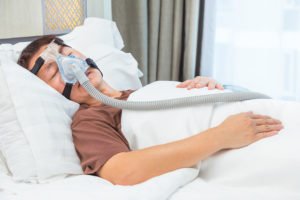Sleep Apnea And Your Oral Health
Sleep apnea is a serious medical condition that causes pauses in breathing while you are sleeping. Over 18 million Americans suffer from symptoms of sleep apnea. If left untreated, sleep apnea could develop into a life-threatening disorder and shorten a person’s lifespan by as much as 18 years.
is a serious medical condition that causes pauses in breathing while you are sleeping. Over 18 million Americans suffer from symptoms of sleep apnea. If left untreated, sleep apnea could develop into a life-threatening disorder and shorten a person’s lifespan by as much as 18 years.
Why Is Sleep Apnea So Dangerous?
Obstructive sleep apnea is considered the most common type of sleep apnea. Obstructive sleep apnea occurs when throat muscles become over-relaxed, blocking airflow and causing you to stop breathing. Once you have stopped breathing, your brain kicks into overdrive, elevating your heart rate to supply oxygen to the body. If left untreated over time, serious health problems can develop, including high blood pressure, heart disease, and stroke.
Who Is At Risk?
Sleep apnea can affect anyone, but there are risk factors that increase the likelihood of developing the condition.
- Age – Sleep apnea is more likely to occur in adults over the age of 60
- Gender – Males are more susceptible to sleep apnea than their female counterparts
- Weight – If you are overweight, you have a greater risk to develop sleep apnea. This is especially true if you are overweight around the upper airways, including your nose, throat, and mouth
- Obstructed Airways – If you have small passageways in your nose, throat or mouth, you are more inclined to develop sleep apnea. While some of this can be attributed to the way you were born, others may be the result of an injury – think of a deviated septum, for example.
- Genetics – Sleep apnea may run in your family, automatically putting you at risk.
- The Use of Alcohol or Drugs – Using alcohol or sedatives to sleep can disrupt your body’s natural sleep cycles, causing you to develop sleep apnea. Smoking can also lead to sleep apnea.
How Can Your Dentist Help?
While you may think of your dentist as someone who solely concerns themselves with your teeth, think again! Your dentist can be one of the first trained health professionals to identify your sleep apnea because you see them more frequently than other physicians. Jaw pains and other physical symptoms can indicate sleep apnea, which could prompt your dentist to direct you to a sleep medicine specialist.
If you have been snoring frequently, wake up feeling tired in the morning or with headaches, are excessively tired during the day, or have been waking up frequently throughout the night, communicate this with your dentist during your next visit. It could save your life!